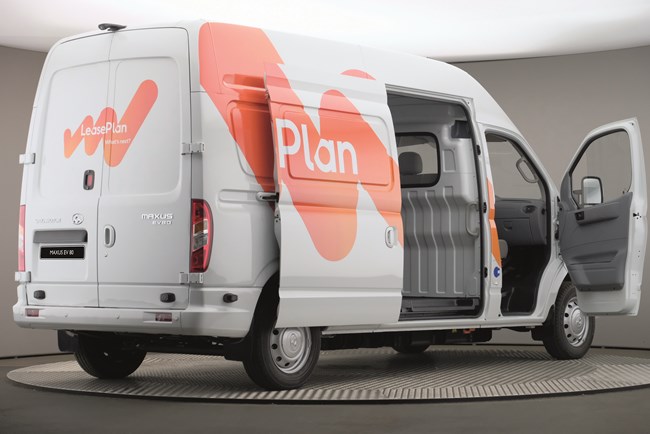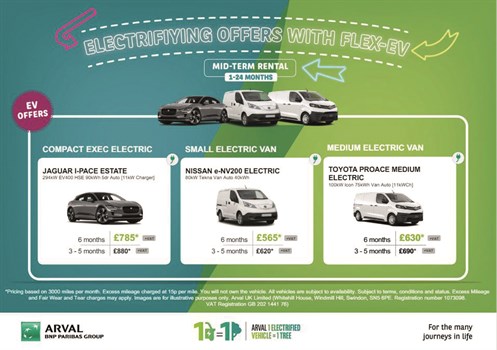- ETRUX launches new Ford E-Transit Trizone
- Renault gives UK debut to Master E-Tech at CV Show
- Isuzu D-Max long-term test – Latest Report
- Isuzu D-Max V-Cross Steel Edition revealed
- IVOTY Report: Stellantis explores the hydrogen proposition
- New Maxus EVs include eDeliver 5 van
- Used LCV values reach six-month high
- ADVERTISEMENT FEATURE: IVECO Daily Mission Awards 2024 Q2 Round-up: Grounds Maintenance & Forestry
- Stellantis Pro One electric vans review
- Mitie adds 5,000th EV to fleet
What Van? Awards 2023: Leasing Company of the Year – LeasePlan
Date: Friday, December 16, 2022

To September 2022 the UK’s new LCV sales fell back by almost 25% year-on-year. This was mainly due to supply problems caused by the semi-conductor shortage and played havoc with vehicle leasing replacement cycles. One of the ways in which LeasePlan UK has combated this is instead of selling off top grade vehicles it has remarketed them into its LeasePlan Flexible Fleet approach, to retain 23% of these high-grade vehicles for existing fleets, 550 of them staying within the vehicle fleet against 380 for the previous 12 months.
One such fleet is that of private security form G4S, who appointed LeasePlan UK (LPUK) in September 2021 because of the specialist expertise it could offer in the light commercial vehicles. With some 1,600 vehicles on fleet – 40% of them vans – G4S was looking for a partner that would not only support its transition to electric, but one that could also help reduce its LCV operating costs, cut its vehicle downtime and provide value-add in other areas.
LPUK Undertook a comprehensive appraisal of the current and mid-term electric van market on G4S’ behalf at the beginning of the contract. Using this information it was able to create an extensive review of the security firm’s van fleet, in line with its ‘Road to Zero’ strategy and emission targets, with 20–25% of the LCVs on its fleet now being on schedule to move to hybrid, electric or full electric within the next three years. LPUK also assumed responsibility for vehicles not part of its original implementation. These included a 30-strong patient transportation fleet for one of G4S’ NHS trust partners, and three further prisoner transfer vehicles for two G4S-run prisons – for both of which LPUK secured new fleet management partners within just six weeks. It also supplied mid-term rental vehicles through its LeasePlan Flexible (LPF) proposition to help G4S overcome a variety of challenges, including the conversion and delivery of an LPF van to serve as a clinical waste vehicle for a G4S NHS Trust partner that was unable to commit to a full, three-year lease. LPUK facilitated this within the space of just one month.
Looking to assist its clients in the move to electric LCVs LeasePlan UK is giving fleets the opportunity to take eLCVs on a three to 24-month basis, without the need to commit to a long-term contract. So far this has resulted in 1,847 electric vans, a figure, up by 520 from the previous year whilst 45 of these vehicles are on the LeasePlan Flexible Fleet (LPF) system, giving operators who are looking to move to EVs greater flexibility. The company has further developed its relationship with BCA which has taken responsibility for the storage and preparation of vehicles in both its pool fleet and LPF areas.
With an eye on the requirements for online management – particularly relevant during the pandemic, LeasePlan has improved the My Fleet online system for its clients. Based on customer feedback it has redesigned its ‘dashboard’ with easier navigation. This gives quick access to the zero-semissions miles covered by hybrid vans, or RDE2 compliance for diesel LCVs within the fleet, direct access to the My Vehicle Check page for vehicle fault reporting, enhanced fines notification and optional driver and history data for individual vehicles within the fleet. In addition, there is also a new greenhouse-gas calculator which shows potential savings by moving to EVs across various fleet parameters and finally an at-a-glance clean air zone database, to assist in fleet operations and route planning.
Highly Commended: Arval

Arval UK now has more than 185,000 vehicles (50,000 of which are LCVs) which are leased to sole traders or the country’s largest corporate businesses alike. In the last 12 months, its customer base has seen an increase of around 7% to almost 90,000 vehicles..
The company pre-orders and buys stock LCVs from manufacturers direct, as soon as they’re available, and strategically re-contracts vehicles where suited. The average lease for an LCV is now 60 months and more than 54% of its LCVs have maintenance included in the contract, helping to reduce downtime and manage costs. Customers are also advised to order around 12 months earlier, and to retain an order once placed. The number of LCVs in its rental fleet, Arval Flex, has increased so that within two days, customers can rent a vehicle from one to 24 months while their new LCV is delivered.
View The WhatVan Digital Edition


